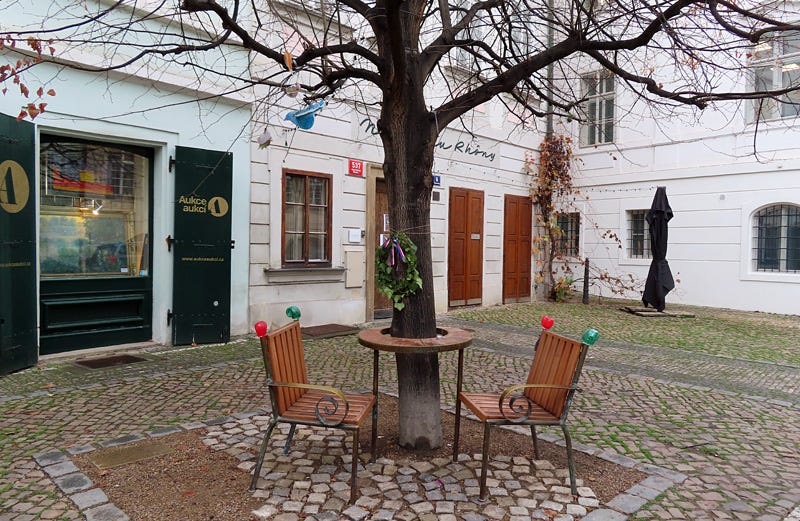Does Substack Give Power to the Powerless?

Last week, while visiting Prague for the second time in three years, I happened upon a trombone trio playing a rendition of Lennon’s “Imagine” in Wenceslas Square. The trombone is more conventionally played at funerals in Czechia, but it was an endearing scene. As I listened, I thought about how fickle ideas can be — seismic one moment and quaint the next.
Lennon’s anthem for dreamers could scarcely find a better home than Wenceslas Square, where the Velvet Revolution pushed the Soviets out in 1989 with the ultimate dreamer, Václav Havel, leading the way. Havel is now as deeply woven into the national myth as George Washington is into America’s origin story. Prague’s international airport bears his name, as do many schools and thoroughfares.
The last time I visited Prague, I brought Havel’s Disturbing the Peace along. As I wrote then, Havel’s comparison of Western capitalism to Soviet rule aligns shockingly well with the corporate takeover of higher education in the United States. While reading Havel’s The Power of the Powerless during this visit, I heard many of the same echoes in what others have been writing about the traditional publishing industry.
So today I want to think a little about Havel’s definition of dissidence and the rhetoric about independent publishing that seems to be crystallizing on Substack. This might seem frivolous, since no one publishing on Substack risks jail time or forced labor for airing their ideas. I imagine the ghost of Aleksandr Solzhenitsyn scoffing at the premise. I am also mindful of how many refugees are presently paying the real price for dissidence or for the lack of it.
But I also believe that suffering has systemic roots and that writers have a unique responsibility to examine the integrity of the systems they inhabit. Apathy about the marketplace, and specifically about the literary marketplace, directly enables the “social auto-totality” that Havel describes in occupied Czechoslovakia. Substack has billed itself as a haven for literary rebels, but we might ask the same question of this platform that Havel asked of the government he replaced and the government he helped establish: “whether we can live with dignity in such a system, whether it serves people rather than people serving it.”
This remains one of the fundamental questions to ask of any technology.
Dreams or Abiding Visions?
The “Heart for Havel” memorial outside the National Theatre might be the most famous tribute to his legacy. But my favorite is “Havel’s Place,” a table built around the trunk of a linden tree with two chairs that represent dialogue. 51 replicas of “Havel’s Place” have been installed all over the world, including one at Georgetown University. It is a simple and lovely illustration of his signature phrase, “love and truth.”
What else but love and truth could come from two people being present to one another, actively listening and following the thread of discovery that rapt conversation requires?

Havel’s ideas endure because of their simplicity. But a phrase like “living within the truth” can come off as naive or overly idealistic. For instance, there are few things more difficult than writing a “true” memoir. Memory is the foundation of identity, our primary reference point, yet it is often as much a projection of what we want to be true as it is of what really happened to us. As Barbara Kingsolver says, “Memory is a complicated thing. A relative to truth, but not its twin.”
But Havel’s principles were forged by resistance, and so his vision is more clearly defined in contrast to the forces that would suppress it. Which is to say that “living within the truth” must be understood as a conscientious objection to “living with[in] a lie.” For Havel, life under Communism required many pretenses of freedom, and passive compliance with that system enabled those lies to continue.
Individuals need not believe all these mystifications, but they must behave as though they did, or they must at least tolerate them in silence, or get along well with those who work with them. For this reason, however, they must live within a lie. They need not accept the lie. It is enough for them to have accepted their life with it and in it. For by this very fact, individuals confirm the system, fulfill the system, make the system, are the system.1
It is easy for an outsider to see little more than schmaltz in the national outpouring of love for Havel. Indeed, skeptics see his dreams as the fantasies of a fortunate son. Havel’s father had built a real estate empire before the Soviet coup took it away, and overthrowing socialism literally restored millions to the family coffers.
But there’s nothing fancy about Havel’s idea that the systems we inhabit ought to be designed for human flourishing, not for the flourishing of the systems themselves. His critique of Communism applies just as equally to capitalism when capitalism grinds humanity underfoot.
Havel wrote these words in 1979, but they capture much of the disillusionment I hear among writers about contemporary publishing — how the consolidation of smaller imprints into corporate empires has created a formulaic approach to literary representation where ROI matters more than craft and the social media horse is perpetually thrust before the cart that once carried innovation, depth, and style.
Part of the essence of the post-totalitarian system is that it draws everyone into its sphere of power, not so they may realize themselves as human beings, but so they may surrender their human identity in favor of the identity of the system, that is, so they may become agents of the system's general automatism and servants of its self-determined goals, so they may participate in the common responsibility for it, so they may be pulled into and ensnared by it, like Faust by Mephistopheles.
Substack has become a refuge for disaffected writers, and it offers a compelling alternative to pitching agents, editors, or magazines who care more about the money they’ll make than the human beings they serve. But many of us who have written on Substack for a year or more will have felt the pressure to conform to its own internal system, which is largely devoted to generating revenue. In fact, there is a disturbing awareness in comment threads of the possibility that Substack founders or staffers might be listening in, that there might be “correct” answers to give about whether we collect payments from readers or not. There are no obvious punishments for dissenting voices, but the overwhelming incentive is to celebrate whatever the leaders roll out, because they have the power to amplify or ignore the voices they choose.
If Substack is to endure, and if it is to live up to its promise as a space where dissidents can gather and perhaps even wrest power back from the publishing empires, it must resist the auto-totality that Havel describes. By this I mean that if Substack is to serve writers, rather than creating another system that writers must serve, it must take Havel’s warning about capitalistic technology to heart:
It would appear that the traditional parliamentary democracies can offer no fundamental opposition to the automatism of technological civilization and the industrial-consumer society, for they, too, are being dragged helplessly along by it. People are manipulated in ways that are infinitely more subtle and refined than the brutal methods used in the post-totalitarian societies. But…those complex focuses of capital accumulation engaged in secret manipulations and expansion; the omnipresent dictatorship of consumption, production, advertising, commerce, consumer culture, and all that flood of information: all of it, so often analyzed and described, can only with great difficulty be imagined as the source of humanity’s rediscovery of itself.
The Ur myth of Substack is that it restores hope and humanity to the writing life. Much of that rings true with my own experience, particularly the collegiality and comradeship I feel with other writers whom I’d never have met otherwise. But I also frequently find that story at odds with the messaging that comes out of headquarters, such as the recent roll-out of new features that allow anyone with an account to post and collect payments without launching an actual publication. Hamish McKenzie wrote, “If you come up with an idea for an article in the shower, you can be making money from it by breakfast. If you’re good at expressing your ideas through voice and video, you will be able to ‘go live’ and watch paid subscriptions roll in as you talk.”
Maybe this is a generational thing, but I do not believe that many shower epiphanies are worthy of immediate monetization. That way of thinking — that writing must be immediately commodified, that art is not worth amplifying unless it already has a built-in marketing plan — is precisely what alienates many of us from traditional publishing.
My purpose for writing on Substack is not to make it rain nickels for Substack.
Winds of Dissidence
Sometimes Czech dissidence takes comic forms, as in The Good Soldier Švejk. But many of the pivotal turning points in national history owe to courageous individuals such as Jan Hus, who challenged the Catholic Church more than a century before Martin Luther nailed his 95 Theses to the Wittenberg door. Hus was burned alive for heresy, but his legacy lived on in the Hussite movement and later inspired Jan Palach’s self-immolation in Wenceslas Square in 1969 after the Soviets crushed the peaceful Prague Spring uprising. Palach’s sacrifice was not in vain: the memory of it drove the 1989 revolution and opened the door to Havel’s leadership.

But dissidence is rarely a choice. As Havel says,
You do not become a ''dissident'' just because you decide one day to take up this most unusual career. You are thrown into it by your personal sense of responsibility, combined with a complex set of external circumstances. You are cast out of the existing structures and placed in a position of conflict with them. It begins as an attempt to do your work well, and ends with being branded an enemy of society.
Ex-pat academics know this feeling. Our dissidence arose from small irritations that, when examined more closely, revealed deeply misalignment between our values and our institutions. Exile was the last thing any of us would have chosen. Our intellectual motherland turned its back on us (or was overrun with occupiers), and our integrity would not allow us to live with that daily betrayal.
I now hear much the same sentiment about the publishing industry from both established and emerging writers. Just yesterday I spoke to someone whose book will be released this fall by a major publisher with no hope of a continuing relationship with that press. Another writer whom I consider among my formative influences has published eight books, many of them with Norton, and enjoys representation by a top-drawer agent, but cannot find a home for his latest novel.
’s recent essay, “Why I Swapped Mainstream Publishing for Indie Publishing,” ’s interview with me (“Recovery Means Reclaiming Your Creative Life”), and ’s “No One Buys Books” all express what can only be defined as dissident views.These are all bibliophiles, writers who bring a sense of calling to their craft and demonstrable success within the traditional publishing model, but who have found themselves cast out of the existing literary structures and increasingly thrown into a principled resistance to it.
pressed the point recently in “The Troll School of Literature,” where he characterized Honor Levy (author of My First Book) as more of “a publicist’s creation” than a writer. In Levy’s case, buzz about a New Yorker piece led to a book deal with a clear marketing angle, only in Kahn’s estimation the buzz was all there was. The book did not reveal an abiding artistic vision or meaningful apprenticeship to craft, which offended his view of the writing life as akin to religious devotion. Acknowledging that he sounds uncomfortably like an “Old Testament prophet,” Kahn goes on to articulate the sine qua non that many of us claim for our writing lives:I actually — like a lot of people on this platform — view writing and literature as a sacred activity. Sacred in the sense that when done well or even just done honestly it represents the attempt of the soul to access itself — and, by sharing that effort, it aims to ennoble the public discourse, to make people better than they are or at the very least to feel a little less alone. I regard that as a far more holy and immediate activity than whatever most churches are supposed to do.
It might seem absurd to compare the plight of the contemporary writer to the most extreme cases of oppression in Eastern Europe. But nearly every dissenting voice that survived Communism found Western capitalism equally appalling for its commercialism and its superficiality. This is why Solzhenitsyn’s 1979 Harvard address, “A World Split Apart,” appears in the subsequent volume A Warning to the West. Indeed, Havel echoes that very phrase in The Power of the Powerless, and his point is not to predict a future doomsday so much as to hold up a mirror to what the West already is: “...[D]o we not in fact stand…as a kind of warning to the West, revealing to it its own latent tendencies?” But the West has never heard or heeded those warnings.
Substack welcomes the literary refugee. But does it offer a fundamentally different system — one that truly restores power to the powerless — or is it more of an amplifier of privilege? Might the platform be leveraged as a source of collective power against the corporate publishing monopolies? And, perhaps more importantly, can Substack successfully resist the tendency of all power structures to breed its own automatism?
Power is only just when shared
At the beginning of The Power of the Powerless, Havel imagines a greengrocer placing a sign in his shop window, “Workers of the World Unite!” This is not because the grocer truly believes he is living in solidarity with other workers or has any faith in the government that his sign represents. He places the sign automatically because that is what every other greengrocer does and because not doing so would attract suspicion and perhaps punishment. Because the sign does not represent the grocer’s honest opinions, it illustrates what it means to live within a lie.
When millions of people behave similarly, living within a lie becomes normalized, automatic. Any individual may refuse to participate by taking down their sign or even putting up a dissident one, and that person might have the satisfaction of living within the truth. But it takes a great many of those actions to disrupt the automatism of the system, sometimes even one as tragic as Palach’s self-immolation.
Many of us who have left academe feel, on some level, that we have burned a part of ourselves in the public square. Each of those acts of defiance expresses a universal truth about the system of higher ed, but so far the system has failed to respond. There have been many localized Prague Springs, but as yet no unified uprising.
The same seems true of independent writers on Substack. Most of us express various forms of passive resistance, opting out of literary contests and magazines, publishing books independently, choosing autonomy over forfeited rights. We do this either because we have been cast out by traditional editors after having once enjoyed insider status, or we do it (or say we do) for creative freedom.
But the existing publishing structure has taken no notice. Sam Kahn can continue penning his jeremiads, other exiles can continue publishing their works independently, and each of those choices might yield the satisfaction of living within a personal truth. But we must find a way to unify if we are to truly disrupt the automatism of how literature is produced in our time.
These are not small stakes. Literature is both a crucible for culture and a time capsule for future generations. There is something sacred about carrying our mirrors through the streets, doing our best to catch our own humanity and that of others in our words.
But is publishing an essay once a week, maybe rolling out a few self-produced books, enough to qualify as dissidence in the literary marketplace?
Once more to Wenceslas Square
I return to the trombone trio tooting their lovely but halting rendition of “Imagine” in the shadow of Saint Wenceslas. As my gaze swept the square, I saw it as a metaphor for Substack and for the dream of literary independence that many of us crave.
Almost immediately after the Soviets left and the process of restitution began, Old Town Prague became an economic frontier. Families that were formerly monied were monied once again, gobbling up more than their share of opportunity. But presumably many businesses were also built from the ground up.
Three decades later, all the hallmarks of commerce stood within a stone’s throw of those trombone players. Wenceslas Square features cafes, souvenir shops, banks, even a casino. It’s more commercial every time I visit. There are a lot of Substack newsletters that run like those businesses with their well-oiled brands, delivering the same goods day after day.
But I don’t go to Prague for the shops. I go for the trombone trios, for the memorials and monuments, for solidarity with other dreamers fumbling to share something beautiful without any real hope of recompense.
This is where I often find myself at odds with the Substack platform and its internal messaging. It is a place where I have found other dreamers, other readers and writers who do not come lightly to the page, but it is also a place riddled with sales pitches and hustle culture. Increasingly, I wonder how long those two faces of the platform can live in tension. Sometimes I feel like Havel’s greengrocer, expected to hang Substack propaganda in my shop window, risking a cold shoulder or shadow ban if I challenge the corporate line. At other times, I feel just as I did listening to those young people keeping Lennon’s music alive.
For many of us, Substack is preferable to the futility of lobbing proposals at an indifferent wall of money-minded agents. But we do not come armed with KPIs and ROI strategies. For us the reward is a more modest but no less precious opportunity to live within our truths, to create our own versions of Havel’s place, our own little tables and chairs where we sit in dialogue with our readers.
The trombone players kept an open case at their feet, and I dropped some crowns in it to show my appreciation. But that wasn’t why either of us were there.
Read more essays like this ⬇️
All quotations from Havel are taken from The Power of the Powerless, Vintage, 1978.





Josh, this is just lovely. So much yearning right now for authenticity, all around. So much opportunity for bringing good people together. Bless you. You're not alone.
The issue is that Substack is a for profit company that achieved a valuation during a period of highly unreasonable valuations. They have a responsibility to their investors to find ways to earn into that valuation.
That's it in a nutshell.
The conundrum is that as writers who love the community we want Substack to succeed and keep all their ideals. The two goals are often going to be at odds.